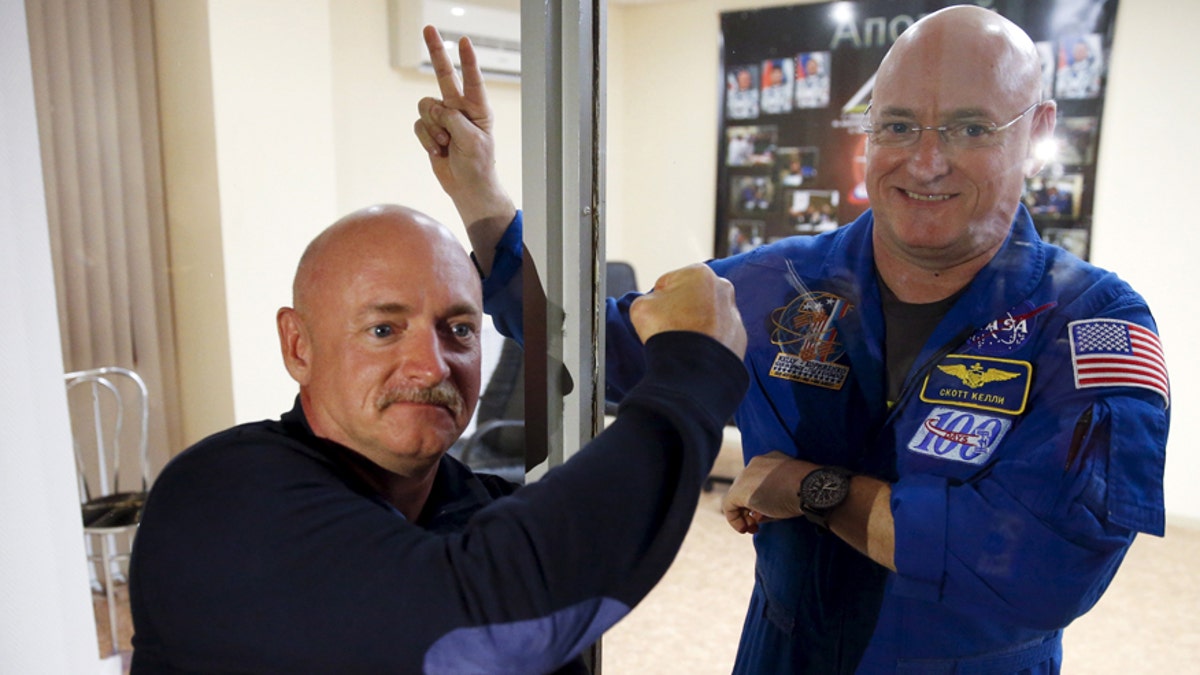
NASA astronaut Scott Kelly (R), member of the 43 International Space Station crew, and his twin brother Mark pose after a news conference at Baikonur cosmodrome March 26, 2015. (REUTERS/Maxim Zmeyev)
If we are going to fly humans to Mars one day, we’ve got to learn more about how being in space affects astronauts. So Friday, NASA begins a landmark, human experiment.
“That would be me. I think I'm the lab rat,” Mark Kelly told Fox News, during a recent interview in Houston. His twin brother Scott followed, “he's the controlled lab rat. I'm the other lab rat."
Identical twin astronauts Mark - now retired - and Scott Kelly are embarking on space, and earth, history.
Scott, who’s spent six months living aboard the International Space Station before, is now doubling down. In a landmark study, he’ll live in space for one year - 342 days, to be exact - all to see what happens. As in, what happens to HIM.
It’s all about going to Mars and beyond. “To have this unique opportunity to be the first American to do this -- and I do feel grateful and feel like I am in a privileged position -- even though you know it's going to be a tough flight being in space for that long," he said.
To get from Earth to Mars, under current rocket technology, it would take 6 months. Then there’s the 6 month return trip. And perhaps you’d spend 3 months on Mars doing research. That’s about 500 days away from Earth.
We’ve all seen the weakened astronauts being helped into chairs upon landing in Kazakhstan. And that’s after 6 months in space.
Microgravity causes bone loss, muscle loss, vision problems and psychological effects due to the loneliness and isolation in small, space compartments.
So, much more must be learned about the physiological drain, mental effects and health issues caused by near-zero gravity and interstellar radiation.
"My hope is that we discover that the mitigation steps that we came up with for the bone and muscle loss are effective and they work,” said Kelly. “The vision problem we have is much different. I mean we really don't understand why that's happening.”
Russian cosmonaut Mikhail Kornienko will also live the next year in space. But since Scott Kelly has a genetic replica in Mark, scientists will study him, too.
Scientists from 12 universities will monitor Mark’s blood samples, his exercise and his overall health, comparing it with brother Scott’s data sent 250 miles down from the space station.
Scott will spend about a third of his day exercising at the Station, mandatory to keep the muscle atrophy at bay. Mark will continue doing his regular exercise routine in Houston. He says everything the twins do during this year doesn’t have to be exactly the same. And that includes what they eat and drink, as well, which - for Mark - is fortunate.
“I live about a mile from an In And Out Burger,” he joked.
“It’s a long time, you know, it really is,” said Mark. “A year of doing anything is a really long time.”
No walks in the park, no restaurants, no beach. For 12 months. So, what does Scott think that he’ll miss the most? Well, he knows what it’s like to be gone for 6 months, as he spent a 6 month assignment on the Space Station back in 2010/2011.
"I do miss the weather and the seasons, but the things you miss the most are the human relationships you have with your friends and family and people you love on the ground.”
Scott Kelly and Kornienko will participate in more than 400 scientific experiments during their 12 months in space.
Kelly has a long-term girlfriend, and two kids from a previous marriage. Kornienko has a wife and a grown daughter. They won’t see their loved ones for a long time, but both will be able to email from the Space Station and make occasional phone calls, all while looking out the porthole as they see “home” revolving beneath them, 16 times a day.




















